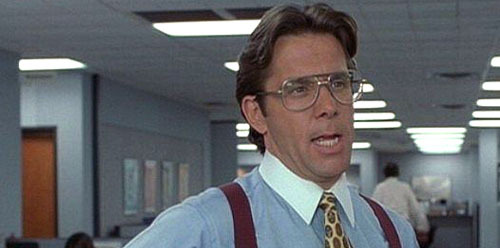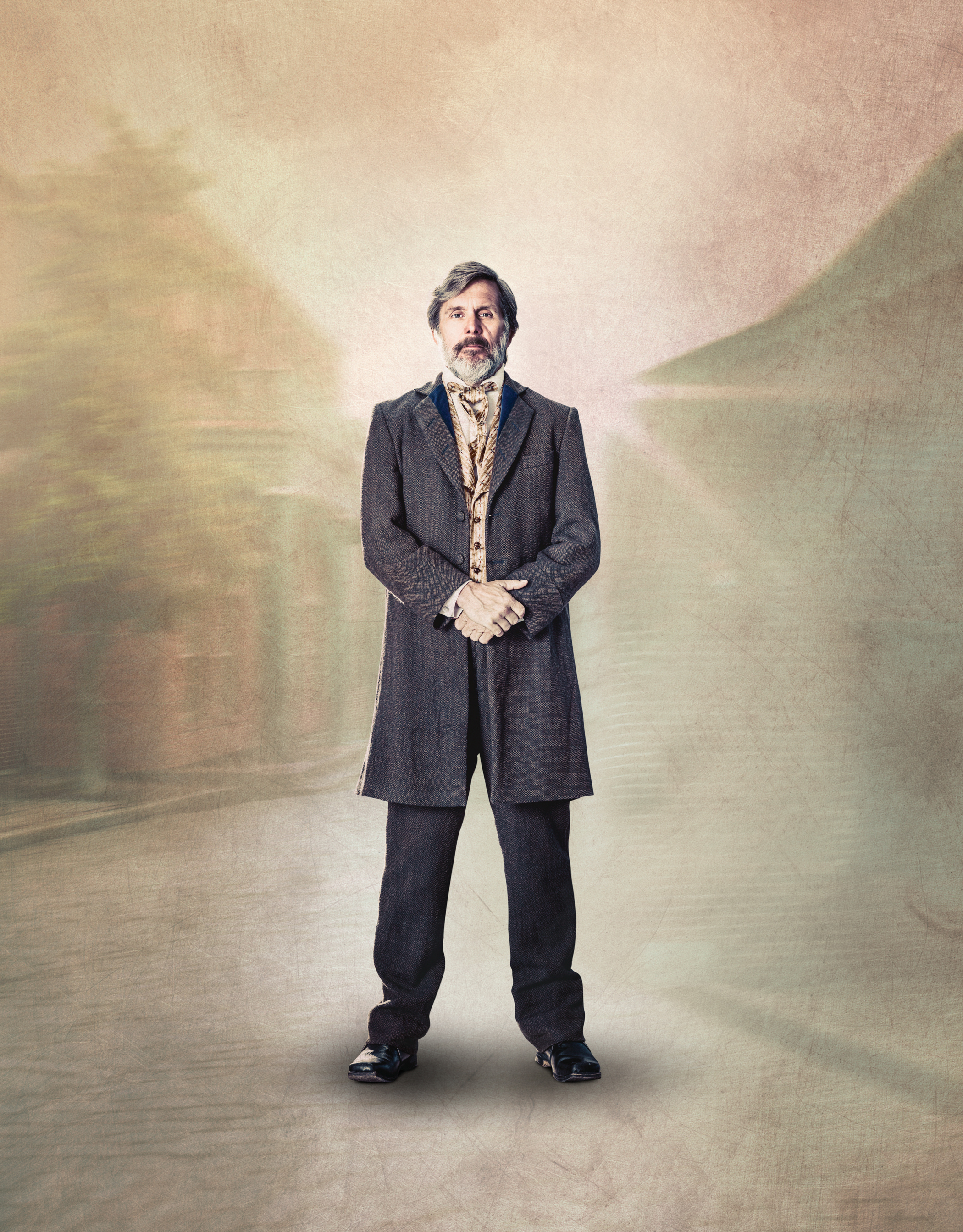A Conversation With Mercy Street Star Gary Cole
December 22, 2016 Leave a Comment
Gary Cole has inhabited roles ranging from an aloof middle manager in Office Space to Vice President in The West Wing and an advisor to the President in Veep. In PBS’ Civil War drama Mercy Street, Cole portrays the wealthy patriarch of a Confederate family living in Union-occupied territory.
As the series enters its second season this month – premiering Jan. 22 on Wisconsin Public Television – we checked in with Cole to ask him about his role as James Green Sr., how his new work on public television has brought his career full circle, and even a few insights into how Office Space became a cult classic.
What have you learned while playing this character?
There is no shortage of material on the Greens, since this is based on an existing family. In preparing for the role, I was lucky that I was able to take the train down from New York and stopped in Alexandria and stayed there for a few days. You can actually visit their site (at the Carlyle House Historic Park.) Just being in Alexandria and getting a feel for what that physically looked like. Here was Alexandria, considered part of the Confederacy, but if you stand on the banks of the Potomac and look over the river, you see the Capitol. They saw the American flag flying, not the Confederate flag. It was just a river crossing away and they were immediately engulfed.
For me what was always kind of unusual about the show, especially in terms of Civil War material, was that it seems like 90 percent of the time when the Civil War is depicted on camera and in print that it has to do with the war itself and everything else takes a back seat. This show is split. Here, the war is really the background to all of these characters. It shows that, when territories are occupied, everything is disrupted. That’s just a piece of history I didn’t think about, nor did I know about until we started working with this story.
In the way The Civil War is often presented to us in our own history education, it seems like such distant history. But, when you start looking into the actual timeframe, it is not nearly as distant as we perceive.
No, when I think about when I was a kid first learning about it, it was not even 100 years old. I was born in 1956. There were still people alive who were involved in it as children. It’s just not that far away. Talk about being a country divided in flames literally, you understand how precarious this choice of government is. In those days, the states had much more individual power than they do now, and that has always been a struggle to this day.
Tell us a bit about the production of Mercy Street. The show seems to take great care in presenting very difficult issues without glossing over the sharp and ugly edges of the war.
It doesn’t take long when you look at the Civil War to see that there were all kinds of issues going on. At the core, certainly is slavery, the sale of human beings, and that philosophy. Even Lincoln was going through contortions to understand how the world was changing. You can go back and look at quotes from Lincoln and he would probably not be viewed as somebody entirely enlightened in the terms of today, but that was the norm. He was someone who allowed people who were more progressed in their thinking than he was to penetrate himself and others to come to a decision. That was, of course, mixed with a lot of stuff. There was politics, the economy. It wasn’t solely, I don’t think, a humanitarian situation when it came to all of the things that he considered. But, it was certainly for a lot of men of his era, unthinkable for what he accomplished. Then, look at what happened to the country.
Talk a bit about how the cast works together, tackling these tough issues and themes that can be so emotionally charged – and in many cases depending on the character being played, activities that are appalling but necessary to tell the story.
To me as an actor, it doesn’t change the way you work on something just because the content may be more of a historical landmark than most things that we know about. It doesn’t change my job description. In this case, though, you want to be informed about what was happening and know as much history as you can.
We have a dialect person, and a person responsible for things as simple as etiquette. Did people hold hands? Or, you would never do that. I was always being told I had to take my hands out of my pockets. Wealthy men didn’t put their hands in their pockets. If you didn’t make a lot of money you could put your hands in your pockets, but if you were wealthy like my character you wouldn’t be caught dead with them in.
Currently between Mercy Street and Veep you are playing characters in two very disparate times – The Civil War in Alexandria and modern day in D.C. in Veep. How do you manage the two roles?
It’s really a non-issue for me. First, there’s a gap in time between the two productions where there is nothing lingering. To be honest with you, though, nothing really psychologically lingers with me for very long after I’m done doing it. That’s a different animal. In theater that is something that might linger with you because you are doing it night after night, there’s more activity with the character. On camera and film, it is so brief the amount of time you are executing a character. And I am not somebody who carries them with me when the camera is not rolling. I like to pace myself to keep myself in a quiet, focused mood. But I really just let things happen in the moment. A lot of that is just being relaxed when the time comes.
What do you look for in a role at this point in your career?
I look at everything. I look at the whole piece and ask, “Is that good, or does it work?” I look at the other elements involved and the other people, certainly the director and other actors. Who is that going to be and who are you going to make this work with? And then you try to envision whether or not you’re going to make it work on some level. And, you go with that.
And, you also go with economics, too, sometimes. How much do I like this, for nothing. Or, how much can I tolerate this for something. There is that factor, too. I would lie if I didn’t mention that the economy or what you are being paid is a factor, because it is.
You grew up here in the Midwest (just outside of Chicago). How did your upbringing inform your work ethic?
I grew up in a fairly traditional household where both of my parents worked. My mother didn’t work right away when I was little but she went to work soon after we went to school. My father worked, I think my father had from the time I grew up in the house, I think he worked in just two organizations. One, he worked for a company that became the Union Oil Company. Then for several years he was the finance director for a township outside of Chicago, and he worked until he was close to 70. He’s retired now. So that was straight ahead. All I knew was he went off to work and came back everyday. There was a roof over our heads and food on the table and some other good stuff. So I figured that’s how it works. But, then I went into show business and realized Holy (expletive)… But, I’ve been beyond lucky and I am still able to pursue what I really like, so far. There are always struggles with that – always times where you think, oh my, what is going to happen down the road? That’s what I like and don’t like about the business. It is kind of a love-hate thing. I like the fact that I don’t know what’s around the corner, that I haven’t had to show up at the same place every morning. But, there’s a trade off with that and that is the actor’s paranoia. So long, so good. It’s been long enough now where I don’t tire myself too much with that because it takes too much energy.
What do you hope audiences take away from the second season of Mercy Street?
I’m not one that worries too much about what the audience takes away. If the audience is compelled to sit in a chair and watch the show, that’s enough for me. It is no business of mine what they take from it, because everyone takes something different. So, I don’t really examine that. I do hope it is compelling, I hope it tells a story, I hope it has a point, I hope people get attached to the characters.
Is Mercy Street your first time working on public television project?
No, the very first on-camera job I got was a PBS Christmas special starring Alan Arkin. I can’t remember the name of it. But, it was great to work with Alan Arkin. (Editor’s note: We found Cole’s one-line role in the 1984 American Playhouse episode, “A Matter of Principle.”)
As someone who was in college as Office Space became a cult phenomenon (and someone who has watched the film dozens of times), I’d be remiss if I didn’t ask you about it while I have your ear. How have you watched your Bill Lumbergh character take on a life of its own?
 Lumbergh was really just me mimicking Mike Judge. The character was based on these Milton animations Mike Judge had made a decade before Office Space. When I first saw that, I just determined that is hysterical. The reason it is hysterical is that you know both of them. Immediately. Even though it is animation, you knew these people. And I certainly knew Lumbergh, because he was everyone’s early boss nightmare. I had a boss that dressed exactly the same as him, with the two-tone shirts and everything. I’m an adequate mimic, so I went into the audition and just ripped it off. And apparently he liked that.
Lumbergh was really just me mimicking Mike Judge. The character was based on these Milton animations Mike Judge had made a decade before Office Space. When I first saw that, I just determined that is hysterical. The reason it is hysterical is that you know both of them. Immediately. Even though it is animation, you knew these people. And I certainly knew Lumbergh, because he was everyone’s early boss nightmare. I had a boss that dressed exactly the same as him, with the two-tone shirts and everything. I’m an adequate mimic, so I went into the audition and just ripped it off. And apparently he liked that.
Now you have all the elements and you have Mike driving the car. You have so much ammunition. You have this great character, set up perfectly with this passive aggressive attitude that is so specific. And then you have all these characters around him that he gets to mildly terrorize just because of his position. I just had to stay out of the way, do what was Mike’s intention was and people identified with it because that culture was so large -especially in the 1990s as corporations were kind of expanding and that whole cubicle infrastructure was blossoming. I didn’t really understand that because I never worked in an office. The only jobs I had before show business were service jobs. When the movie started to take off, and not in the theater, of course, but started to live on after that, I didn’t really understand why, but I thought “Wow, people are really drawn to this.” It’s a combination of how the foresight of Mike Judge in creating these characters blended with what was happening in the country – all these middle managers that people wanted to strangle, and Lumbergh represented all of them. People had a character that they loved to hate.
The result, I imagine, is that 15 or 20 years later, you can’t go a day without someone throwing an Office Space quote at you on the street.
That’s true. When you think about it, that film is coming up on 20 years old. It’s still in the conversation at certain times. Not at the time, it lived on and then social media happens and of course there is every Lumbergh meme you can imagine. You never know if you are going to be in a movie that is going to make an impact. We all knew it was a good movie when we were doing it, because we all knew Mike was a brilliant writer and director. But, we had no idea. I’m walking down the street two years after the release of this movie that ran for five weeks in the theater and people start shouting out to me about their TPS reports, and I go, “What the hell is going on?” And one time is one thing. All of the sudden it was continuously happening – people coming up and saying “Hey Lumbergh!” I thought this movie had tanked! It was a time and place with movies and the way entertainment was consumed was changing. DVDs were peaking, all these stations like Comedy Central ran it numerous times. So, movies just because they didn’t do well in the theaters didn’t mean they necessarily died. They had a chance at another existence beyond that. And that’s the story of Office Space.
Program interview Wisconsin History The Civil War Q&A PBS Mercy Street public television Wisconsin Public Television Wisconsin Public Television
 Passport
Passport






